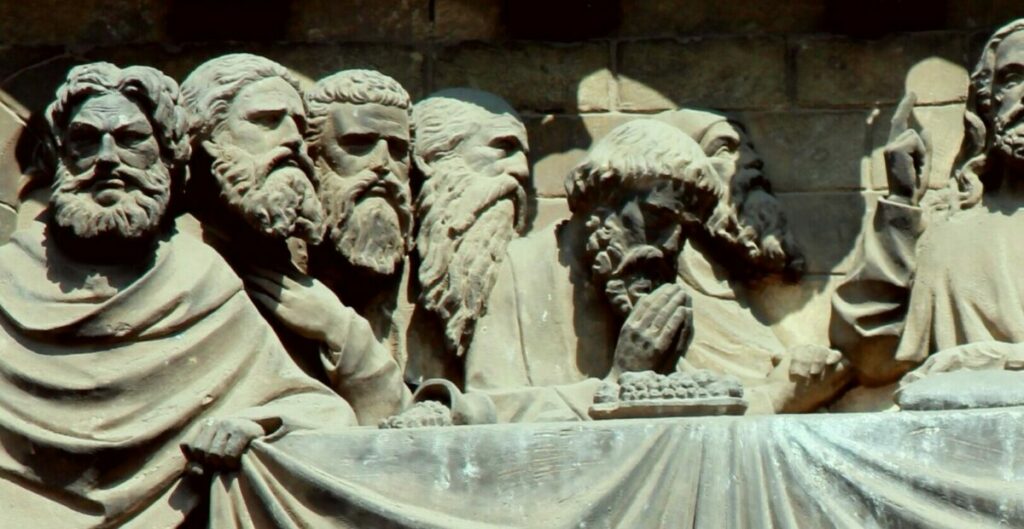by David H. Petersen
This year Epiphany, January 6, will be on a Sunday. That is a very happy thing. Since it falls on a Sunday, more people will observe it by attending a worship service. There they will hear the account of the Magi’s visit first to Jerusalem and then to Bethlehem to meet the infant King of the Jews.
The world is long done with Christmas by January 6. The Church is not. In the Church, Christmas is celebrated for twelve days. It begins on December 25. It culminates on Epiphany.
Christmas Eve gave us Luke 2. Christmas Day gave us John 1. Epiphany gives us Matthew’s account of Our Lord’s birth. That is part of the goodness of observing Christmas Day and Epiphany along with Christmas Eve. The three Gospels work together to give us a fuller picture of God becoming Man in Bethlehem.
The Magi have often been called “wise men” in the Church. That is not because of their astronomy and great learning. It is not even because they were clever enough to recognize the significance of the star. They are thought of as wise because they worshiped the Baby Jesus. They were wise, while Herod and the religious leaders of Jerusalem were foolish. That Herod was foolish is not a great shock. The foolishness of those who knew the Messiah was to be born in Bethlehem, and who had no need to search the Scriptures for this detail, is. Why didn’t they follow the Magi so that they could worship Him? Weren’t they impressed by the star?
The wisdom of the Magi is also surprising. They were worse than stock Gentiles: they were Magi. That is the root word for our English word “magician.” They might have been astronomers, but it is more likely they were astrologers and sorcerers who worked for their pagan overlords in the East. The last we heard in the Scriptures about people in this line of work, they were failing to interpret Nebuchadnezzar’s dream and being openly hostile to Daniel, the prophet of God. Of all the Gentiles, the Magi would have been some of the most unlikely converts and worshipers. Yet they worshiped Him. In this they foreshadowed the mission to the Gentiles and the power of the Gospel. God makes saints for Himself out of sinners.
Consider the parallels with Christmas Eve. There we hear of the revelation of the Incarnation to Jewish shepherds. They discovered God as a Man, in the weakness of a Baby. He was lying in poverty, in a manger. There had been no guestroom available for Him. The shepherds were not the heads of state or business or leaders of religion. They were unlikely persons for this honor, yet they received it. So also it is unlikely that they were expecting the sort of Messiah they found that night. Nonetheless, they worshiped Him. God makes saints for Himself out of sinners.
Christmas culminates twelve days later with a similar revelation to the Gentile Magi. Jesus was not what they expected either. He did not live in a palace. He was not loved by His people. He was anointed for a different sort of throne and He wielded a power entirely distinct from that of Herod. Even though He was not what they expected, the Magi worshiped Him and gave Him gifts.
The Gospel confounds the wise and comforts the simple. Christ the Savior came not to rule us by the exercise of power, but by sacrifice and mercy. He became meek and lowly for the meek and lowly. Judged according to the ways of men, He is unlikely Savior, but so it is that in this way He makes saints out of unlikely people.
The Rev. David H. Petersen is the pastor of Redeemer Lutheran Church in Ft. Wayne, Ind.







I really enjoyed this article. It is things we know, but great reminder of the humble beginnings of our Savior. And the lack of wisdom of the Religious leaders of the day in spite of all the prophesies they read.
Thank you, Reverend Petersen, for this explanation of the joys and mysteries of Epiphany. Do we know how the wise men first learned about the Messiah? Would they have had access to Old Testament prophetic scripture? Could you please explain the significance of the different gifts they gave to our King? Was it normal custom to give these kinds of gifts to a new king, or did they also know there was something different about this new King? Thanks.